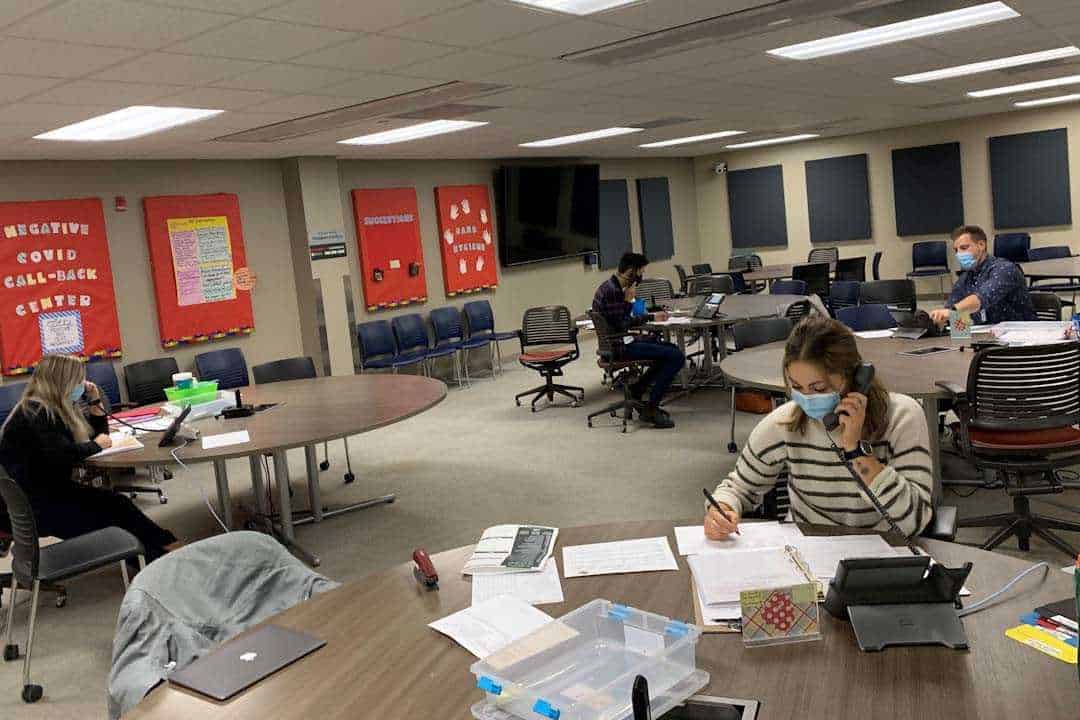
Fourth-year nursing students are learning the importance of public health messaging through relaying COVID-19 results to people.
The College of Nursing has partnered with the Saskatchewan Health Authority and Public Health to create the Negative COVID Callback Centre. With cases rising in the province, the NCCC is assisting the SHA in providing a timely response for those who test negative. Fourth-year nursing students who are completing a community nursing class are on rotation with at least eight students in a room at a time to make the phone calls.
Zoe Dahl, a fourth-year nursing student, says that it has been a unique experience from the start.
“With COVID-19, I don’t think there would have been another opportunity for this,” Dahl said. “It’s given us the opportunity to learn a little bit more about what public health does and then also work with some preventative care … instead of just the four walls of a hospital.”
According to Dahl, seven students set the centre up. Their work began with creating scripts, assessing what to ask people during their phone calls and looking at different health disparities in the community.
She says that being part of the process has been “overwhelmingly positive.”
“The unknowns were how many people could be reached and [whether] this was going to be a success. I think [the unknowns], mixed with this possibility of being able to create exactly what we wanted to give back to the community, were really cool and exciting,” Dahl said.
“Once we got it off the ground, it was cool to look back and [say], ‘Wow, we created that from scratch.’”
The NCCC has been operating for almost a month now. According to Dahl, there’s a new group of eight students working for the centre each week, which makes for about 50 nursing students currently involved with the centre. They work on Monday, Tuesday and Wednesdays starting at 8:15 a.m. and go 12 hours a day with another group relieving them in the evening. Despite the long hours, Dahl says she’s received positive feedback from members so far.
“A lot of people have said that it’s such a great learning opportunity,” Dahl said. “I think that’s really positive too, and now more people are getting excited to go back in and do a little bit more of that.”
Tish King, an instructor from the College of Nursing, says that the NCCC and it’s policies were created in under one week, which was a great feat in a short amount of time.
“The NCCC student leadership team has worked extremely hard and their efforts have surpassed all expectations,” King said. “I couldn’t be more proud of these students, who are the future of nursing in Saskatchewan.”
Jill Werle from the Saskatchewan Health Authority says that the work these students are doing is “behind the scenes … in the larger system in responding to COVID-19.”
“As future health professionals, we hope this experience leads to a better understanding and even a passion for the important role public health plays in the health of our community,” Werle said.
Dahl urges other nursing students to get involved and ask questions. She admits that it is an overwhelming start because of the fast-paced environment, but she encourages her peers to “continue to be curious” and move forward.
Dahl says the most important lesson she has learnt so far is the importance of collaboration.
“I think it just reinforces the fact that the nursing profession, it’s not an individual profession,” Dahl said. “You’re accountable for a bigger picture than just yourself.”
—
J.C. Balicanta Narag | Editor-in-Chief
Photo: Supplied | Negative Covid Callback Centre
Leave a Reply